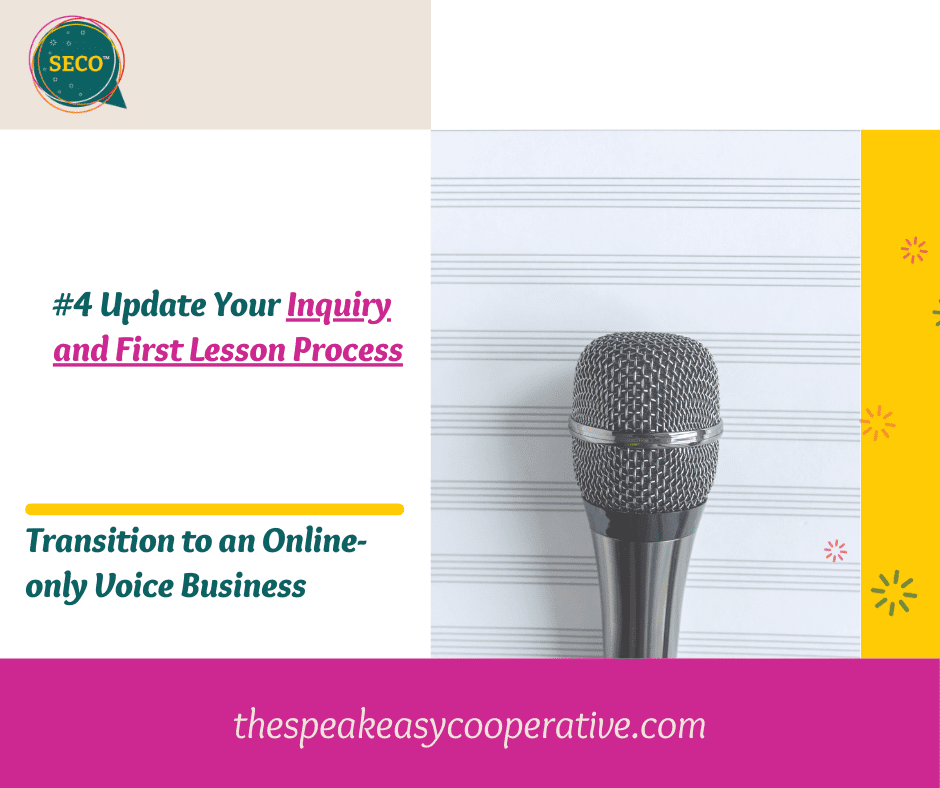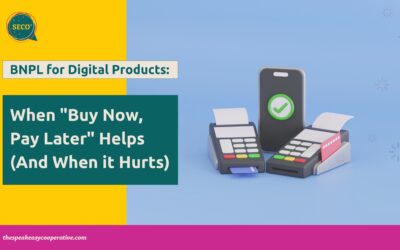It’s July (!!!!) 2021, and for some of the world, it seems as though we are “done” with COVID, and “ready to get back into the studio with real, live people. Problem is, some of us don’t want to go back in-person, now, or ever again. If you’re in that boat, I’d like to share with you some considerations on how to transition to an online-only voice business by reviewing your Inquiry and First Lesson Process.
Depending on how effectively you were able to deliver your service over the last year, this may or may not be a lot of decision-making and change. I find that many people have to reframe what they are used to doing and being in order to be successful at this transition.
Starting June 3, I began giving itty bitty bites of info on each of the concepts noted below in the bullet list. My hope is that you’ll have some time to chew on each concept and gain some headway in how you approach your transition!
These blogs will not be a “this is exactly what you should do” checklist. Think of them more as “here are some things to consider as you move forward”, because essentially, you are opening a new type of business.
When you choose to remain as an “online-only” voice business, you’ll want to reframe your mindset around a few things we cover in this 5 Part Series:
Shall we begin? Today is Part 2. We are talking about:
Updating Your Client Inquiries and First Lesson Process for Online Clients
I am going to assume that you have some sort of inquiry process already – even if you’re a local word-of-mouth business.
Even if your inquiry process is a text message… that’s a process.
As you know, there is no single right way to do anything, still, when you’ve released your business to the whole wide internet world, you’re going to want to take into consideration how you vet people and how you lead people through their customer journey.
Here is the potential problem: Now that you are 100% online, you’re probably going to be doing a fair bit of marketing to people outside your local area. This means that the type of information your potential singers are looking for will change.
There is going to be less likelihood of you having a chance to know this person and have them know you, so you’ve got a fine line to draw around sending people forward in their customer journey without being gross and salsey. You’ve got to sell. No way around that!
Still, how you handle an inquiry is a lot of that process.
Three Reasons to Reframe Your Inquiry Process
- Most of the time, if you’ve done your job well, the initial inquiries you get will convert to members of your client community. You want to be sure you have capacity for the right clients.
- Understanding that we are in a sales process puts us in a mindset of confidence and leadership right from the get-go.
- There’s always a level of free involved with sales – it’s best that you are being intentional around your time and energy with this level of free, so that you don’t burn out or get resentful of humanity.
Some people who reach out to you are kind of freaked out. They don’t really know what they are looking for.
Some have never been in music lessons, or looked for lessons for their kids before.
Some have been in lessons all their life, and know how easy it is to get a dud of a teacher.
Others are in lessons now, yet looking for another teacher because they would like to supplement their current training.
In short, they are nervous. They show this nervousness by coming off as confident, cool, sophisticated, and knowledgeable. They do or say or ask things that really aren’t appropriate. For example: they assume it’s okay to come to lessons on Sunday mornings. Or, they tell you how much they are “willing to pay” or when they will pay. Sometimes, they show their nerves by not emailing back when you respond.
Most of the time, clients treat us based on their past experiences with other businesses like ours. Since online lessons have been kind of a Wild West, and there are so many new online teaching spaces opening up, you’ll want to be aware of the way previous online experiences have impacted your potential client.
Part of our work with them is to calmly, clearly, and kindly communicate how it works in our businesses – we communicate the scope of service and the terms and conditions. If they have never experienced this kind of clarity before, they may freeze. It’s our job to have those things accessible for them on our website or have a place where they can learn these things effectively and efficiently.
I like to think of three “C’s” for the response to an online inquiry of any kind. This holds for no matter how I get an inquiry: a marketing thingy I did, or a referral, or an e-troduction.
The Three C’s for Responding to Online Inquiries:
- Compassion:
- Show the person that you understand their situation by reiterating what you’ve read in their email or intake form. YES! PLEASE! Take the time to really really really READ their email/text/messenger/intake form, or listen a few times to the voice mail. Reword what you have heard them say. Pay attention to their tone of voice, and what they say their needs are (or think their needs are!) Restate that.
- Clarity:
- Clearly lay out the way that you do things. THIS IS A MUST! Hear me out friends… this is not the time to “be flexible”. WHY? Because they do not know how you roll! They need the nitty gritty details… what you do, how you do it. You may or may not want to speak of what it potentially costs/does cost, depending on your model.
- Talk about what their next steps with you will be. Provide them with context, information, and a laid out “this is how we get started”… Do NOT fret about sounding bossy. They are coming to YOU because YOU are the expert!
- Note: this is where a lot of business owners get hung up. When asked what they do, the answer is “I teach voice lessons”. When I ask “How?” I get a look like I have grown a second head, as if OF COURSE I SHOULD KNOW. Remember, your potential client does not know what it looks like to be in lessons with you – even if they’ve taken lessons before – how do YOU do lessons? In short, what is your offer?
- Connection/Call to Action:
- Give them the literal ways to connect with you. This is commonly called a “call to action”. It means a real thing for them to do next. For example:
- “Schedule our phone consult here!” Provide a link to your scheduler, or give three times and dates for them to choose from.
- “Book your Intitial Fit Session here!” Again, provide the link, or time/date options.
- “Call me on [date and times] and we will get you started!”
- “Reach out to [insert better fit person], and tell them I sent you!” (this is when you are preeeeety sure you aren’t each others’ people.)
- Give them the literal ways to connect with you. This is commonly called a “call to action”. It means a real thing for them to do next. For example:
The way you handle the very first interaction will say VOLUMES. It’s why quotes like “You only have one chance to make a first impression” and “People will forget what you said, but they will always remember how you made them feel” exist.
Quick Mojo Makers:
- Remember that people reach out because there is something about your marketing that has communicated that they need you. They are not 100% sure how to proceed.
- You are the expert! Yes, you are! Act like it, aight? (Note this doesn’t mean you have all the answers, so just leave that at the door.)
- People are BUSY. They want to be guided into what to do next. Don’t make people guess.
- Make it easy for people to give you money… don’t you HATE it when you are trying to buy something and it’s hard?? You wind up going away, because so not worth it!*
- When you are doing your “three C’s”, stay away from long paragraphs. Use short sentences and bullet points.
- Use your REAL voice… write as though you were speaking. People are savvy now ~ they will get a vibe from you based on how you type.
- A trick here is to voice memo your response first. Then transcribe and edit.
- When people do not know you yet, you’ll have to follow up. A lot. Get used to it. You are not being pushy. You are not being desperate. You are being excellent at customer service.
- Make a template for this and other emails. Or you can wait for mine to come out. Or both. Whatevs.
First Lesson for a new Online Client
Congrats! You handled that first inquiry call like a CHAMPEEEEN* and now you’ve got a first lesson set up.
Everything we do, and everything we ask of our potential new online clients, will communicate something to them about what we offer and how we will be to work with since they have no real person-to-person touchpoint.
Because of this, the number one thing to get clear around is:
What is my desired outcome of this first session?
If your desired outcome is “GET A WARM BODY PAYING ME RIGHT THIS VERY NOW!”, that’s a fine place to start! Let’s not stay there, though, mmmmkay? Nekkedtruth: I’ve met SO. Many. Studio owners who do not have a clear intention behind the first session. They feel interviewed and auditioned; they feel they have no control over what happens during and after the session. They live in “I hope” land: “I hope they approve of my policies” I hope they aren’t scared of my rates” I hope they like me”.
When we know what our desired outcome is, we give ourselves the gift of leaving “I hope” land far behind…We move to “I will” land: “I will make this parent at ease” I will communicate clearly and effectively, and build trust” I will know that this student is right for me, and I am right for them.”I will have this client sign up for [insert time frame/session number]” I will make this client feel safe, empowered, and able”
In my company, there are three desired outcomes for the Initial Fit Session:
- To be 100% sure that I want to work with and be paid by this client.
- To be 100% clear on which service offer is best for this client.
- To pass on the inquiry, book the next lesson, or create a package, based on the answers from 1 & 2.
Guess what, awesomesauce? You’re the boss, the expert, the crafter of the online experience. How can you make it stand out? What is your “goodie bag at the door”? Figure that out, and your clients will love you for it.
The only thing you do not have control over on your end is the internet. I wish I could fix this for all of us, but alas. Those darn upload speeds are a doozy. Even with ethernet!
Now it’s your turn!
Answer the following/Do the things:
What are your desired outcomes for the first session? Make a list.
- Be specific and bold.
- Do know what you need out of the client in an online experience.
- Do they follow instruction well over the internet?
- Is their space condusive to their stated desirable outcomes?
- Do own that there is more than their voice that you care about.
- Do they know how to use computers and tech?
- Are they savvy with time zones and schedulers?
- Can they be in a desired location for their lessons?
- Do believe for every second that you have the ability to guide how this time in the session goes, even if you do not have control over the internet.
- Do know what you are going to say at the end, so the client knows what to expect next.
- Do know what you need out of the client in an online experience.
Now, take that list, and dream about how you would achieve those outcomes. You’ll choose these things based on your learning philosophy and your business needs.
- Do you need an intake form? If so, what kind of questions need to be on it? In online land, I 100% believe this is a best practice. (This is one of the reasons I use Acuity. Incredibly robust intake form options. This is not an affiliate link, they got rid of that program.)
- Do you need them to sing a song? How will you communicate where background tracks/piano parts will come from and be played?
- Do you need them to sing through exercises? How do you want to achieve that online?
- Where and when will you ask for them to decide about moving forward?
- How will you communicate at the beginning, middle, and end of the session?
Once you’ve got that hammered out, you can come up with the outline you’ll follow.
The Less Human Touch, the More Guidance is needed.
Online lessons are in a great place, “thanks” to COVID-19. Whereas before we were still arguing about if online lessons should even be a thing, now we are assuming they are, and it’s one of many deliverability options.
What’s important to remember is that our online services will now be compared to *other types of online things*.
Ask yourself what YOU look for when you go searching on the internet… usually, you want specifics on
where to go to learn information, clear calls to action, and to know about the company you are about to give your time and money to.
When ordering goods, you want to see clear descriptions, pictures, have an easy check-out option.
When booking services like an eyebrow wax or a pedicure, you want to know availability and cost.
Take these ideas into consideration as you move forward with your online inquiry and booking, and you’ll be ahead of the game!
And, of course, these things will help any brick-and-mortar in-person business, too.
How are you changing your inquiry and first lesson process?
All My BeastyBoss,

P.S. * If you get the CHAMPEEEEEN reference in this blog, I will give you a gift. Seriously. Comment below if you get it!






0 Comments